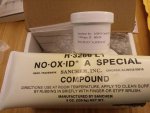Stuck at the apartment with kids this morning so I'll catch up on the posts I missed yesterday.
Is the oxidation considered "corrosion" (like eventually reducing the copper to dust), or is it more like a sealed coating?
That was what I always thought the green "patina" was about (but believe me I'm no chemist or anything).
Oxidation of copper is the reaction of oxygen atoms with the copper atoms. This reaction converts copper into copper oxide, a blackish substance. The copper starts to look "dull", then dark, then black - you can see this effect with older wiring when you strip near the original exposed ends. Copper oxidation that occurs with the addition of salts or other contaminants will result in a patina, which is essentially a "pickling" of the outer copper layer, and like pure aluminum oxide this layer is very robust.
To be sure, the conductivity of copper oxide and other corrosion is much lower than pure copper, in fact copper oxide is considered a semi-conductor and is how some companies moving from silicon chips to copper are making transistors. In a power circuit, you want conductors to carry power, and other components to control and use the power. A semiconductor does not make a good wire, so efforts like tinning a wire strand as an oxygen barrier will keep it running as a good conductor for longer.
...I see green patina on copper exposed to the elements. But have seen a white powdery corrosion on electrical connections, whats the difference?
That sounds like you might have a contaminant on the wire as it corrodes. If you are in an area with road salts, sea air, or even terminals near a battery - modern lead carbonate plates can yield a carbonate salt vapor out the battery vents while charging/discharging this will condense on any surface that is below the dew point for that vapor, and will build up and react over time.
Clean, clean, clean!!! Then use a corrosion inhibitor spray near the battery to prevent future corrosion. I have heard the praises sung for No-Ox, I bought a few jars and a tube of it to play with for this purpose (conductive corrosion inhibiting grease), for battery terminal I've used a
generic red protective spray, there are many various equivalents for this.




